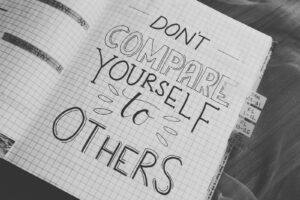Stop Comparing Yourself to Others: Overcome Negative Body Image
In a world dominated by social media and unrealistic beauty standards, many individuals find themselves trapped in a continuous cycle of comparison, leading to negative body image and self-doubt. It’s crucial to recognize that comparing yourself to others not only affects your self-esteem but can also lead to feelings of inadequacy. This article aims to help you break free from the comparison trap and embrace a more positive outlook on your body and self-worth.

Photo by Kristen Plastique on Unsplash
Understanding Negative Body Image
Negative body image refers to the distorted perception individuals have about their physical appearance. It often manifests through feelings of inadequacy and a constant tendency to compare oneself to others, particularly in terms of body types and beauty standards. Those who struggle with negative body image may engage in negative self-talk and feel the pressure to conform to unrealistic ideals. Understanding what negative body image truly means is the first step toward overcoming it and cultivating a healthier mindset.
Defining Negative Body Image
At its core, negative body image is rooted in a person’s perception of their body as inadequate or unattractive. This perception can be influenced by a variety of factors, including societal expectations, media portrayals, and personal experiences. Individuals may find themselves constantly comparing their physical appearance to that of influencers or peers, leading to feelings of jealousy and insecurity. Recognizing this definition is essential for those looking to stop comparing themselves to others and to begin their journey towards a more positive self-image.
The Impact of Comparison on Self-Perception
The act of comparing ourselves to others can have a profound impact on our self-perception. When we find ourselves scrolling through social media, we may experience feelings of comparison that trigger self-doubt and reinforce negative body image. This comparison game can create a vicious cycle, where the more we compare, the more we feel inadequate. To break free from this cycle, it’s vital to shift our mindset and embrace our unique qualities, recognizing that everyone has different body types and experiences.
Common Triggers for Comparing Yourself to Others
Several common triggers may lead individuals to compare themselves to others. Social media platforms often showcase edited and curated images that perpetuate unrealistic beauty standards, making it easy to fall into the comparison trap. Additionally, societal pressure to adhere to specific body types can exacerbate feelings of inadequacy. Understanding these triggers can help individuals look inward and practice gratitude for their own bodies, making it easier to resist the urge to compare and instead focus on self-acceptance.
The Dangers of Comparison
How Comparison Affects Mental Health
The dangers of comparison are profound, especially in a society where individuals are constantly bombarded with images that depict unrealistic beauty standards. When we find ourselves comparing our physical appearance to others, it often leads to negative self-talk and decreased self-esteem. This comparison can manifest as feelings of inadequacy and self-doubt, which negatively impact our mental health. It is essential to recognize that the tendency to compare ourselves to others is a common struggle. To overcome these feelings, we must shift our focus from external validation to self-acceptance, allowing ourselves the space to embrace our uniqueness and cultivate a positive body image.
Social Media and Its Role in Body Image Issues
Social media plays a significant role in perpetuating body image issues and encouraging individuals to always compare themselves to others. Platforms filled with curated images and influencers can distort our perception of beauty, making it challenging to feel good about our own bodies. The pressure to conform to these beauty standards can lead to jealousy and feelings of inadequacy. To combat this, it’s vital to practice gratitude for what our bodies can do, rather than solely focusing on their appearance. Unfollowing accounts that trigger negative feelings and surrounding ourselves with positivity can help us break free from the comparison trap and promote healthier self-esteem.
Recognizing the Inner Critic
Recognizing the inner critic is crucial for those looking to stop comparing themselves to others. This inner voice often amplifies feelings of insecurity and reinforces negative body image. By acknowledging this critic, we can begin to challenge its narrative and replace negative thoughts with affirmations that celebrate our individuality. It is important to practice self-compassion and realize that everyone has different body types and experiences. Instead of constantly comparing ourselves to others, we should strive to embrace our authentic selves and recognize the good in our bodies, which can ultimately lead to a more fulfilling and positive life.
Strategies to Overcome Negative Body Image

Photo by Katrina Wright on Unsplash
Shifting Your Mindset
To stop comparing yourself to others, the first step is to shift your mindset. This transformation begins with recognizing the negative self-talk that arises during moments of comparison. By consciously choosing to dismiss thoughts that make you feel inadequate, you can cultivate a more positive narrative about your body and self-worth. Affirmations can aid this process, allowing you to focus on your unique qualities rather than perpetually comparing yourself to others. Embracing a mindset of self-acceptance is crucial to breaking free from the comparison trap.
Practicing Gratitude for Your Body
Practicing gratitude for your body can significantly improve your body image and self-esteem. Instead of focusing on perceived shortcomings, take a moment each day to appreciate the things your body can do. This might include recognizing your strength, flexibility, or even the simple ability to walk. By consciously shifting your focus from what you dislike to what you love, you can combat feelings of jealousy and inadequacy. Over time, this practice will help you feel better about yourself and reduce the tendency to compare with others.
Building a Supportive Community
Building a supportive community is vital in overcoming negative body image issues. Surrounding yourself with individuals who uplift and encourage you can help counteract feelings of insecurity. Engage with friends or groups that prioritize body positivity and self-love, and avoid those who might contribute to the comparison game. This sense of belonging can provide reassurance and diminish the pressure to conform to unrealistic beauty standards. By fostering meaningful connections, you can create an environment that helps you embrace your unique journey and celebrate your individuality.
Embracing Your Unique Journey
Focusing on Personal Goals Instead of Comparisons
To truly embrace your unique journey, it’s essential to focus on personal goals rather than constantly comparing yourself to others. Establishing your own benchmarks for success allows you to celebrate your progress without getting caught up in the comparison trap. Whether these goals involve fitness, health, or personal growth, aligning them with your values will help you stay motivated. By striving for your own achievements and recognizing the different body types around you, you will cultivate a more positive self-image and reduce feelings of inadequacy.
Celebrating Small Victories in Self-Improvement
Celebrating small victories in self-improvement is a powerful way to build self-esteem and combat negative body image. Each time you achieve a goal, no matter how minor, take a moment to acknowledge your progress. This could be as simple as completing a workout or choosing a healthy meal. Recognizing these achievements fosters a sense of accomplishment and encourages you to continue striving for more. By cultivating an attitude of gratitude and positivity, you can further distance yourself from comparisons and appreciate your journey toward self-love.
Living Your Best Life: Beyond Comparisons
Living your best life means recognizing that your worth is not defined by comparison with others. It involves focusing on what makes you happy and fulfilled rather than getting caught up in the pressure to look a certain way. Embrace the idea that everyone has different body types and experiences, and celebrate your own uniqueness. By letting go of the need to compare, you can fully engage in life, pursue your passions, and enjoy the journey of self-discovery. This shift in perspective will empower you to cultivate a healthier body image and enhance your overall well-being.
What does it mean to stop comparing myself to others?
To stop comparing yourself to others means to consciously choose to focus on your own journey, achievements, and self-worth rather than measuring your value against the lives or physical appearance of others. It involves recognizing that everyone has unique experiences and challenges, and that comparison often leads to negative feelings such as insecurity and self-doubt. By shifting your focus inward and embracing your individuality, you can cultivate a healthier self-image and a more positive outlook on life.
How can I overcome negative body image?
To overcome negative body image, start by practicing self-compassion and acceptance. Identify and challenge any negative self-talk that arises, replacing it with positive affirmations that celebrate your body and your abilities. Engage in activities that make you feel good, and surround yourself with supportive individuals who uplift you. Additionally, consider consulting a mental health professional if you find it difficult to navigate these feelings alone. Remember, overcoming negative body image is a journey, and it’s okay to take it one step at a time.
Why do I constantly compare myself to others?
The tendency to constantly compare ourselves to others is often rooted in societal pressures and unrealistic beauty standards perpetuated by media and social platforms. This comparison can stem from a desire for validation or acceptance, making us feel inadequate when we don’t measure up. It’s important to recognize these triggers and actively work to shift your mindset. Embrace the idea that your worth is not defined by others—focus on your own goals and what makes you unique.
What are some strategies to break free from the comparison trap?
To break free from the comparison trap, consider implementing the following strategies: First, limit your social media usage or unfollow accounts that trigger negative feelings of comparison. Next, practice gratitude daily by acknowledging the things your body can do and the positive aspects of your life. Set personal goals that focus on self-improvement rather than competition. Lastly, cultivate a supportive network of friends who encourage and celebrate your uniqueness instead of promoting comparison.
How can I practice gratitude to improve my self-esteem?
Practicing gratitude can significantly enhance your self-esteem. Start by keeping a daily journal where you write down three things you’re grateful for each day. These can be small moments, accomplishments, or qualities about yourself that you appreciate. Over time, this practice helps shift your focus from what’s lacking in your life to the abundance that already exists.
Additionally, consider expressing gratitude to others. Take time to write thank-you notes or verbally acknowledge the people who have positively impacted your life. This not only strengthens your relationships but also reinforces your sense of belonging and worth.
Another effective technique is to create a gratitude jar. Each day, write down something you’re thankful for on a slip of paper and place it in the jar. Over time, this visual representation of your gratitude will serve as a powerful reminder of the positive aspects of your life, boosting your self-esteem.
Incorporate mindfulness practices, such as meditation or deep breathing exercises, to help you cultivate a grateful mindset. Focusing on the present moment can enhance your awareness of the positive experiences around you, fostering a deeper appreciation for life.
Lastly, challenge negative thoughts by countering them with gratitude. Whenever you find yourself dwelling on self-doubt or criticism, take a moment to list things you appreciate about yourself. This practice can help reframe your mindset and promote a healthier self-image.
By consistently practicing gratitude, you not only improve your self-esteem but also cultivate a more positive outlook on life, enhancing your overall well-being.



